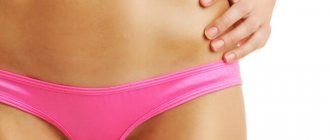The life of a modern woman is sometimes filled with stress, and one of the best medicines against it is organic and dosed physical activity, which helps normalize the emotional background and relieve nervous tension. And, naturally, swimming will help in this matter in the best possible way. Its benefits for general physical condition are undeniable. But what about swimming during menstrual periods? Is it possible to go to the pool while menstruating?
Experts' opinion
So, is it possible to go to the pool during menstruation, according to gynecologists? Every month, a mucous plug forms in the female body, the task of which is to protect the genitals from the penetration of various microbes. The plug shell leaves the body together with menstrual blood, that is, menstruation helps cleanse the body of harmful substances.
Is it possible to go to the pool while on your period? Many people are interested.
During menstruation, the genitals are at great risk. The female body can become infected with a large number of different infections and microbes, especially when bathing. This is due to the fact that many bacterial agents are concentrated in water. Thus, taking into account the above reasons, doctors unanimously do not recommend visiting public pools during menstruation. It is recommended to postpone classes for a while, thereby protecting yourself from many diseases.
Visiting the pool during menstruation, we study the pros and cons
There is no definitive answer to this question, because there is a certain risk, and it is worth remembering. After all, there are bacteria everywhere, even in the pool, where the water is regularly cleaned. But since a lot of people go there, it’s very easy to get infected with something, and treatment can then be protracted. Therefore, it is worth thoroughly studying all the pros and cons of visiting the pool during menstruation:
In any case, during the menstrual cycle, you should take care of your body, listen to it and not overload. It's easy to cause damage, but much more difficult to fix.
Why should you avoid swimming these days?
Going to swimming pools during menstruation is not recommended for the following reasons:
- Possible infection. In public places, the water is very dirty, despite the fact that it is purified with various chemicals. There is still a very high risk of contracting an infectious disease. During menstruation, a woman’s cervix is slightly open and vulnerable, so neither pads nor tampons can save her from possible infections.
- Excessive physical activity. During menstruation, it is extremely undesirable to engage in sports, including swimming. The body is weakened during this period, so your health may deteriorate greatly: headaches and arterial hypertension may occur.
- Hygiene rules are not followed. Blood can get into the water where other people are swimming, it can remain on a towel, swimsuit, or a woman’s legs, which is not very aesthetically pleasing.
In addition, the water in swimming pools is saturated with large amounts of chlorine. This can cause irritation on the mucous membranes of the genitals during menstruation.
Girls who have recently started their periods need to be especially careful. If an adult woman’s body has already prepared for menstruation, then for a teenager, excessive physical activity and changes in water temperature can be stressful. This will affect your well-being: you will feel dizzy, feel weak in the body, and may also lose consciousness.
It is important to find out in advance whether it is possible to go to the pool while on your period.
Is it possible to swim with a tampon?
The best water treatment during menstrual periods is taking a shower. Swimming in any other body of water carries a risk of infection, so during menstruation it is better to refrain from such activities. But if this is still necessary, then you need to use special tampons for the pool, and also reduce your stay in the water to a minimum.
In a swimming pool
In a good pool, where the water is properly purified and heated to the required temperature, the risk of microbes entering an unprotected body is minimal. Therefore, in such a place you can swim with a tampon if you stay in the water for no more than half an hour.
It is advisable to visit such establishments not in the first days of menstruation, when the discharge is especially heavy and the woman feels unwell.
On the sea
The risk of infection when swimming in the sea on critical days is much lower than in other bodies of water. Salt water is a good means of protection against pathogenic bacteria. The main thing is to follow the rules:
- wait out the first couple of days, when the discharge is heaviest;
- do not go into cold water, so as not to get inflammation of the genital organs;
- Avoid swimming in the sea if you feel unwell.
In open waters
Swimming in a river, lake, or creek is the most dangerous compared to a pool or sea, since a large number of different bacteria are present there. The hygiene product absorbs moisture both from the inside and outside, so the uterus, unprotected from infection, can suffer greatly. And in cool water on such days it is easy to catch a cold in the reproductive organs. Whether it is worth risking your health for the sake of being in water of questionable quality, each woman decides for herself.
What are the visiting rules?
The first and basic rule is no harm to yourself and others. A woman should understand that unforeseen situations may occur while swimming in the pool. As a result of heavy discharge, leakage may occur, causing significant discomfort, and the impression of others will be greatly spoiled.
To prevent this from happening, it is important to adhere to certain rules for safe visiting the pool during menstruation:
- If a woman is not sure that training in the pool will go well, she should refrain from visiting it for a certain period.
- You should not visit the swimming pool in the first days of menstruation, as this is when the heaviest discharge occurs.
- It is recommended to use comfortable hygiene products that do not cause significant discomfort.
- It is necessary to change the tampon immediately after leaving the water. This need is due to the ability of tampons to strongly absorb water, which can lead to infection.
- When visiting the pool, you should not use pads.
- It is recommended to have a black or dark-colored swimsuit in stock, since even the slightest discharge will be noticeable on light-colored swimsuits.
- Before and after swimming, you must take a contrast shower.
- What should you not do during your period? During this period, you should not eat salty or fatty foods or drink coffee. An unbalanced diet can cause long and heavy discharge.
- If menstruation is accompanied by severe pain, it is necessary to take painkillers. The best option would be to refuse to visit the pool and get proper rest.
Gynecologists recommend following these tips, and also remembering that every woman’s body is individual.
Let's go to the sea: how to move or delay your period for a week
Sea. Swimming in warm water on a long-awaited vacation... Eh, everything is fine, but your body lets you down at an unpleasant moment, when you want to swim and your period comes at sea, or as people call it “business”. Agree, it’s a shame: your tummy hurts, you have discharge, you can’t even take a swim, wear beautiful white underwear or a dress for the evening...
What to do if you get your period at sea? What to do if your period begins at sea? How to go to the seaside with menstruation, what to do?
Let's make a reservation right away - it all depends on the characteristics of the body - some girls and women feel so bad during menstruation that they don’t need any sea, they should lie on the bed in the fetal position, so that no one touches them! And this is understandable. It hurts, it hurts terribly...
Doctors do not recommend swimming during menstruation in the full phase of menstruation, from the 1st to the last day of menstruation.
If you really want to, then all girls know only one way to protect themselves from germs in water: insert a tampon from a trusted company into the vagina, for example, Tampax and OBi.
In this case, you need to avoid swimming and jumping into the water as much as possible. You should enter smoothly and swim freely so that the water does not penetrate into your body.
But still, for the first two days, when your periods are heavy, it is advisable to refrain from immersing yourself in water.
It should be noted that after leaving the water, the tampon must be changed immediately.
Hygiene is primarily for the body.
Also, take note that you are unlikely to be able to tan until black - during menstruation, the female body practically stops producing melanin, which is responsible for darkening the skin.
One of the tricks, an effective way to prevent menstruation at sea, is to use birth control pills.
You just need not to take a break from taking contraceptives, then your period will come only next month, but such experiments can be dangerous, and therefore they should only be carried out under the supervision of a gynecologist.
This method is only suitable for those who take birth control pills regularly, and you should not start taking them specifically before going to the seaside.
Useful advice for choosing a swimsuit if your tampon has failed you and you decide to swim
Don't choose a two-piece swimsuit: panties and bra. Buy a bikini and wear a pareo on top in the sun. Think about your trip to the beach. And let it all be dark tones, it doesn’t matter whether it’s blue, gray or black.
In this case, even if an “accident” happens, you can safely get to the changing cabin. These extra precautions will only help you in the first two days, when the discharge is the heaviest.
The rest of the time, the possibility of leakage is significantly reduced depending on your body structure.
Drugs that help move your periods
The whole problem with any drugs is the usefulness and harmful side effects. Not all medications help with periods moving forward or backward.
To begin with, at least in winter or spring, check in advance with caution how your body reacts to taking medications that break the menstrual cycle.
If the drug has moved forward or backward, trust only it. But still use with caution!
Dicynone
known for its ability to stop heavy bleeding by acting on the walls of blood vessels; however, it is not recommended by doctors for delaying menstruation, since the drug has not passed appropriate tests; if you still decide to use it for delay, remember that more than once a year (unless there are special doctor’s orders) a course of taking dicinone tablets is not advisable; start taking the drug three to five days before the start of your period: two tablets (250 mg) until you want to resume menstruation.
Progestins
. Before taking any drugs from this group, you need to at least know approximately what days your periods begin in order to be able to prevent them in time without harming your body. Start taking progestins two weeks before your period starts and continue until your period is expected to end.
Combined oral contraceptives.
As was mentioned earlier in this topic, to delay “critical days”, choose monophasic contraceptives; you can start taking them no later than three days before the start of menstruation. Remember an important detail: the earlier you started taking birth control pills, the greater the likelihood of “stretching out” your cycle!
Parsley decoction.
Oddly enough, parsley helps reduce periods.
Pour a glass of boiling water over a small bunch of parsley and leave for three hours; take the prepared product half a glass twice a day for four days.
Parsley will not really help delay the “red days”; it is more useful when they need to be reduced. Remember an important detail: if during a normal cycle your periods last seven days, then after parsley decoction they will last only three to four days!
Be sure to consult a gynecologist about your vacation at sea without menstruation. Don’t take a vacation when you know that during your vacation days you will have your period at sea.
source
Source: https://zen.yandex.ru/media/id/5a9cfbacd7bf21ccc81c9eff/-edem-na-more-kak-sdvinut-ili-zaderjat-mesiachnye-na-nedeliu-5aae32bd2f578cdb5e368e69
Rules for selecting tampons for swimming in the pool
There are no principles for choosing tampons. A woman should independently choose such a remedy, taking into account her body and sensations. Only through experience can one find out whether she should continue to use certain tampons or whether she should opt for another hygiene product. If a girl uses tampons often, then she is unlikely to have any complications in choosing one.
If a girl is just starting to use such hygiene products, then it is recommended to opt for small tampons. If you plan to visit the pool, you need to buy products that have a good absorbent surface. If these are not suitable for a girl for certain reasons, then she should stock up on hygiene products while visiting a public pool and change them as often as possible, for example, every 10-15 minutes.
Menstrual cup
If a woman does not use tampons, they do not inspire confidence in her, the use of a special device is allowed. This cup does not cause allergic reactions and is often used by women suffering from various irritations and other pathologies. Its use is convenient both in the first days of menstruation and in the following.
The menstrual cup is small in size, the principle of its operation is that it draws in menstrual flow and holds it. It is very convenient to use and almost completely protects women from bleeding. Bowls are appreciated by those girls whose lifestyle is active and involves frequent visits to the pool.
What to do if you have a great desire to swim
Many women, even those who pay great attention to their health, are sometimes unable to refuse swimming in a beautiful lake or other body of water during menstruation. If a girl finds herself in a similar situation, she should protect herself as reliably as possible. Therefore, it is recommended to follow several tips:
- You should use a tampon before swimming.
- After leaving the water, you should immediately change your tampon and take a shower.
- In addition, douching will not be superfluous.
- It is also necessary to change your underwear, putting on dry and clean ones.
Contraindications
Certain activities are preferable, but there are exercises that are best avoided. Women can continue their regular exercise routine during their period, but with slight modifications to reduce training stress during this time.
Take a pain reliever before training. Even if you don't feel symptoms yet, taking a non-steroidal anti-inflammatory drug such as ibuprofen an hour before exercise will prevent pain in advance.
Avoid fatty, sweet or salty foods. Fast food causes gas formation, spasm of the smooth muscles of the intestines and female reproductive organs. During your period, stay away from:
- Bakery products such as donuts, muffins.
- Processed snacks such as chips, crackers.
- Fried foods such as French fries.
- Soda, alcohol.
Avoid movements that place excess stress on your stomach and back, such as abdominal presses or planks while on your period. As soon as you feel pain, you should immediately take a short break. Cramps, bloating, and other unpleasant symptoms are a logical reason to take a break from sports. Drink plenty of water, then try again the next day. Exercising during menstruation is indeed more traumatic.











